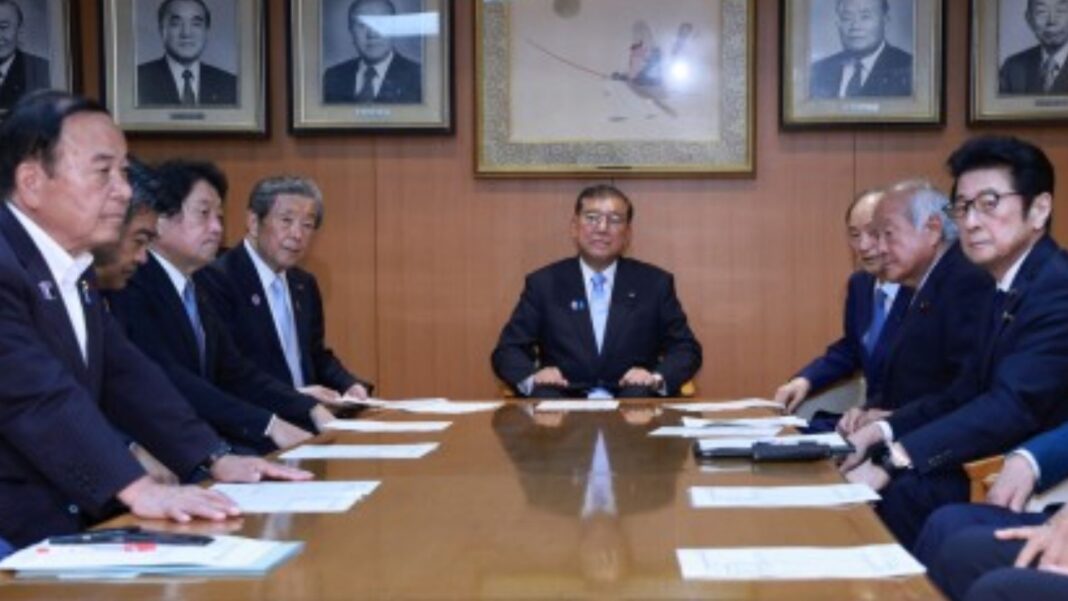Japanese Prime Minister Shigeru Ishiba’s ruling coalition lost its majority in Sunday’s election for the House of Councillors, the upper chamber of parliament.
The coalition of the Liberal Democratic Party and Komeito had already lost its majority in the House of Representatives, the more powerful lower chamber, in last year’s election.
This is the first time since the LDP was established in 1955 that the party has fallen short of a majority in both chambers of the Diet while in power.
In Sunday’s election, the main opposition Constitutional Democratic Party of Japan failed to expand its Upper House presence, while smaller opposition forces Sanseito and the Democratic Party for the People markedly increased their seats thanks to support from voters critical of the LDP-led government.
Within the LDP, calls for the resignation of Ishiba are mounting. The political situation is likely to be unstable.
But Ishiba, who took office last October, has declined to step down. “We must be aware of our responsibility to fulfill for the nation and our responsibility as a top party. I will take charge of it,” he said on television.
He aims to seek cooperation from opposition parties to expand the coalition, though the outlook is uncertain.
CDP leader Yoshihiko Noda said, “The people delivered a vote of no-confidence in the Ishiba cabinet.”
Ishiba said, “Discussing (an expansion of the ruling coalition) with those who are responsible for the future of the country is an option.”
But Noda, who wants the election result to eventually lead to a change of government, said, “A grand coalition (of the LDP and the CDP) would be impossible.”
Nippon Ishin no Kai (Japan Innovation Party) and the DPFP also denied the possibility of joining Ishiba’s ruling coalition.
In a press conference early Monday morning, Noda expressed a willingness to work with other opposition parties in the Diet, stating, “We want to have a sincere dialogue with each party.”
However, opinions on key issues differ significantly among the CDP, the DPFP, Nippon Ishin, the Japanese Communist Party and Reiwa Shinsengumi. In addition, it is unclear to what extent these parties can cooperate with Sanseito, which calls for strict regulations on foreigners under its “Japanese first” policy.
Japan holds an election of Upper House lawmakers with a six-year term every three years, with half of its 248 seats contested each time.
In the latest poll, however, a total of 125 seats were up for grabs–74 for prefectural constituencies and 50 for the nationwide proportional representation system plus one vacancy in the Tokyo district created by the resignation of a lawmaker with a remaining term until 2028.
The biggest election issue was how to address persistent inflation.
LDP President Ishiba criticized opposition proposals to cut or scrap the consumption tax and tried to win voter support with a plan to provide a cash handout of 20,000 to 40,000 yen per person.
But support for the LDP did not increase, apparently because the party failed to provide solutions deemed effective in addressing voter dissatisfaction and anxiety.
In the election, the LDP won 39 of the Upper House seats contested this time, while Komeito incurred a record-low number of only eight seats.
The coalition’s total Upper House strength fell to 122 seats including those not contested this time from the pre-election level of 141.
The CDP, which secured 22 seats in Sunday’s poll, saw its total strength unchanged at 38.
By contrast, the DPFP boosted its strength to 22 as it won 17 seats this time, exceeding the minimum required to submit bills including a budget independently in the upper chamber.
Sanseito, which added 14 seats to increase its strength to 15, has become a force that can submit bills not including a budget independently in the chamber.
Political group Team Mirai has qualified to be a political party as it secured an Upper House seat and garnered at least 2 pct of proportional representation votes in Sunday’s election. The seat was won by group leader Takahiro Anno, who ended fifth in last year’s Tokyo gubernatorial election.
Meanwhile, political group Path to Rebirth failed to win any seat. Its leader is Shinji Ishimaru, who finished second in the Tokyo governor race. (PNA)


